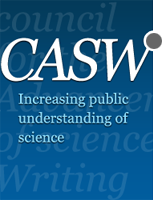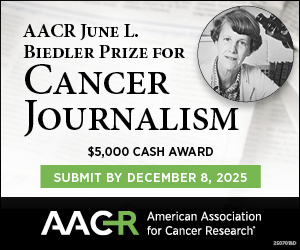FOR IMMEDIATE RELEASE (September 19, 2011)
Contact: Ben Patrusky 212.254.8685 bpatrusky@casw.org
RON WINSLOW OF WALL STREET JOURNAL RECEIVES VICTOR COHN MEDICAL SCIENCE REPORTING PRIZE
Ron Winslow, the New York-based deputy bureau chief for health and science and a veteran medical reporter at the Wall Street Journal, has been awarded the 2011 Victor Cohn Prize for Excellence in Medical Science Reporting. Winslow was cited for the “exceptional breadth, precision and clarity of his coverage about how technological innovation is transforming the world of medicine.”
The annual prize, for a body of work published or broadcast within the past five years, was established in 2000 by the Council for the Advancement of Science Writing (CASW), a non-profit organization of science communicators and educators dedicated to improving the quality of science news reaching the public.“Ron Winslow has long been at the forefront of authoritative coverage of medical research and its impact on healthcare delivery,” said the judges. They took special note of his ability to consistently provide reliable, nuanced reporting about new developments and to place them within the broader social and economic context. “When I read a Ron Winslow story,” said one of the judges, “I know I’m in completely trustworthy hands.”
The prize committee said that Winslow’s career in journalism has been distinguished by a sterling reputation among scientists and fellow journalists for his fair and enterprising coverage. He is considered by many of his colleagues as the current dean of medical reporting.
In her nominating letter, Stefanie Ilgenfritz, bureau chief of the Journal’s health and science group, called Winslow “a singular journalist whose contributions to the public’s understanding of medical science are unmatched…. It is only someone with Ron’s keen eye for detail and innate sense of story who could weave science, personal narratives and broad economic context into the kind of story that makes even the arcane world of clinical trial protocols compelling to the layman.”
“He’s also got a keen eye for the quirky story, that good read you just can’t resist, “said the AP’s Marilynn Marchione, the 2010 Cohn Prize winner in her letter supporting his nomination In others letters endorsing his nomination, several reporters noted how influential Winslow has been in encouraging and mentoring young journalists in this field.
The stories submitted by the Journal on Winslow’s behalf included “Major Shift in War on Cancer,” which combined news announcements at a major national cancer meeting with dozens of interviews to yield, as the judges described it, a “compelling, beautifully framed” account of the role of genetics in targeting cancer treatments. Another story, “A New Rx for Medicine,” about the ambitions of two women – a breast cancer patient and her surgeon – to speed up drug testing highlighted Winslow’s masterful feature writing and storytelling skills, the judges said. And a 2007 story, “Opening Arguments – The Case Against Stents,” was well ahead of the pack in questioning the conventional medical wisdom that had led to overuse of the device, they added.
Winslow, a graduate of the University of New Hampshire in Durham, began his journalism career 40 years ago as a reporter for the Rhode Island’s Providence Journal, and later, while teaching English and journalism at the University of New Hampshire, continued to write as a freelancer for The New York Times and The Boston Globe magazines among other publications. He joined The Wall Street Journal in 1983 as a reporter covering electric utilities and nuclear power. Two years later he was named assistant national news editor, in charge of the papers science and energy section, and a few months later, news editor. He returned to reporting as a senior special writer in 1989, covering healthcare and medicine. He subsequently also served as health and science news editor of the paper, before his appointment in 2008 as deputy bureau chief for health and science. His work has been recognized by the American Heart Association and the National Alliance for the Mentally Ill.
The $3000 Cohn Prize will be presented on October 15 in Flagstaff, Arizona at an awards banquet held in conjunction with ScienceWriters2011, a joint meeting of CASW and the National Association of Science Writers (NASW). The annual gathering includes NASW’s professional workshops and CASW’s New Horizons in Science briefing for journalists, this year to be held at Northern Arizona University.
The judges for the 2011 prize were Ben Patrusky, CASW’s executive director; Cristine Russell, a freelance science writer and senior fellow at Harvard’s Kennedy School of Government; Joann Rodgers, a freelance writer and faculty scholar at the Johns Hopkins Bioethics Institute; and Matt Clark, former medicine editor of Newsweek magazine.
This year marks the 12th presentation of the Cohn Prize for Excellence in Medical Science Journalism. The inaugural award in 2000 was shared by Laurie Garrett of Newsday and Lawrence K. Altman of The New York Times. Subsequent recipients, in addition to Marchione of The AP, were Jon Palfreman, a public television documentarian; Dan Q. Haney of The Associated Press; Shannon Brownlee, a widely published magazine and newspaper journalist; Michelle Trudeau of National Public Radio; Rick Weiss of the The Washington Post; Jerome Groopman of The New Yorker; Geeta Anand of The Wall Street Journal; Joe Palca of NPR; and Denise Grady of The New York Times.
The award honors the late Washington Post medical writer and health columnist Victor Cohn, who distinguished himself by the effectiveness of his reporting during a 50-year career. He was also a co-founder in 1959 of the Council for the Advancement of Science Writing.


